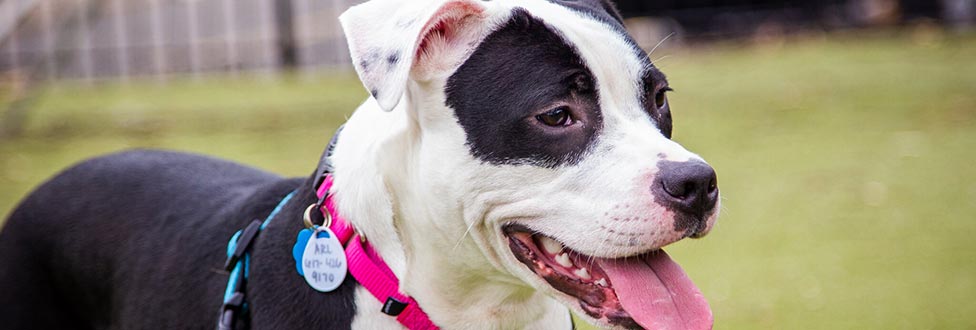5 Facts About Pit Bull-type Dogs
As part of National Pit Bull Awareness Month, we wanted to share some important information about Pit Bulls, a “breed” that often gets a bad rap. Unfortunately, Pit Bull-type dogs often come to our Animal Care & Adoption Centers because their owners face housing and insurance restrictions prohibiting certain breeds of dogs.
Here are 5 facts that you need to know about Pit Bull-type dogs:
1. FACT: The “Pit Bull” is not an official breed.
“Pit Bull” is an umbrella term commonly reported to contain the following 3 registered breeds of dogs: Staffordshire Bull Terrier, American Staffordshire Terrier, and American Pit Bull Terrier.
Many dogs that are classified as “pit bulls” are actually a combination of mixed breed dogs of unknown pedigree or other purebred dogs which bear some physical resemblance. It is not easy to identify a dog’s breed origin(s) from appearance alone, therefore many dogs who are labeled as Pit Bull-type dogs are actually not.
2. FACT: While some Pit Bull-type dogs were historically bred for the purposes of “blood sports”, the majority were bred to become family dogs and farm help.
In the 1970s, dog “blood sports” (i.e., dogfighting, street fighting) began to get more attention by law enforcement and, therefore, the media—making the public much more aware of these cruel practices. The hype drew people to the conclusion that the Pit Bull-type dog’s history of involvement in “blood sports” made them uniquely dangerous.
The truth is that one cannot predict a dog’s behavior based on what the ancestral breed was “historically bred for.” Instead, each dog should be assessed as a unique individual based upon their overall temperament and upbringing.
3. FACT: Pit Bull-type dogs are not born aggressive
Ever heard the phrase “nature vs. nurture”? Well, that applies here too. Pit Bull-type dogs, just like any other type, follow “learned” behavior taught by the humans who raise them.
To put it simply: an attentive caring owner will raise a happy well-adjusted pet. A neglectful and abusive owner will raise an unhappy aggressive pet. More often than not, Pit Bull-type dogs who display aggressive behavior are often the victims of irresponsible ownership.
4. FACT: Pit Bull type dogs do not have “locking jaws”
No such “locking jaw” mechanism exists in a Pit Bull-type dog or any other dog type or breed. There is nothing uncommon about the size and functionality of a Pit Bull-type dog’s jaws or teeth. Additionally, there is no evidence which proves that one dog type or breed is uniquely capable of inflicting serious injury to humans or other animals.
5. FACT: You should consider adopting a Pit Bull-type dog from your local shelter
If you’re looking to add a new furry family member to your household, think about saving a life and adopting. When a Pit Bull-type dog is properly matched to your family and lifestyle, it is a success story in the making. Pit Bull-type dogs are loyal companions, quick learners, and make great exercise buddies.
If you are considering adopting, make sure you visit a shelter that offers behavioral assessments and enrichment programs for all adoptable animals. At the ARL, for example, staff can that provide insight into a dog’s overall temperament, health, and upbringing. It is always a good idea to bring everyone in the household (including other dogs) to the shelter with you to ensure that your new addition is the right fit for your home and family.

